
Computer Supported Cooperative Work-The Journal of Collaborative Computing and Work Practices
metrics 2024
Innovating work practices to enhance collective efforts.
Introduction
Computer Supported Cooperative Work - The Journal of Collaborative Computing and Work Practices, published by SPRINGER, stands as a leading platform for research in the field of collaborative computing, providing essential insights into work practices that enhance group efforts in diverse environments. With an impressive impact factor and high-ranking position in the Q1 category of Computer Science, this journal not only showcases cutting-edge research but also fosters interdisciplinary dialogue among scholars, practitioners, and educators. Operating under the ISSN 0925-9724 and E-ISSN 1573-7551, this esteemed journal encapsulates research converged from 1992 to 2024, revealing an extensive history of contributions to the development and understanding of cooperative work systems. Catering to a global audience, the journal emphasizes the importance of collaboration in technology-mediated contexts, making it an invaluable resource for anyone seeking to explore the innovative intersection of technology and teamwork.
Metrics 2024
 0.80
0.80 2.00
2.00 2.70
2.70 73
73Metrics History
Rank 2024
Scopus
IF (Web Of Science)
JCI (Web Of Science)
Quartile History
Similar Journals
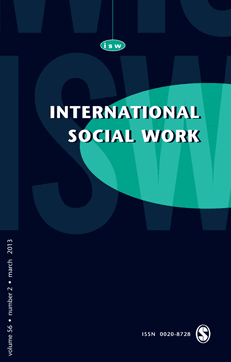
INTERNATIONAL SOCIAL WORK
Inspiring Progress in Social Work and Social SciencesINTERNATIONAL SOCIAL WORK, a leading journal published by SAGE PUBLICATIONS LTD, offers an essential platform for disseminating high-quality research and practices in the field of social work and social sciences. With a strong impact factor and a distinguished presence in the Q1 quartile ranking for Social Sciences, Social Work, and Sociology and Political Science, this journal has established itself as a key resource for academics, practitioners, and students alike. The journal welcomes diverse perspectives and innovative approaches to social issues, promoting critical discussions and evidence-based solutions. Since its inception in 1959, INTERNATIONAL SOCIAL WORK has committed to enhancing professional practice and advancing theoretical developments, making it indispensable for anyone dedicated to research and practice in international social work. Readers can access current and past issues, which together reflect the journal's ongoing contribution to the field and its commitment to fostering global dialogue on social justice and welfare.
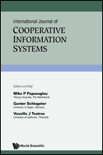
INTERNATIONAL JOURNAL OF COOPERATIVE INFORMATION SYSTEMS
Empowering Scholars Through Cooperative InnovationsINTERNATIONAL JOURNAL OF COOPERATIVE INFORMATION SYSTEMS
Published by WORLD SCIENTIFIC PUBL CO PTE LTD, the INTERNATIONAL JOURNAL OF COOPERATIVE INFORMATION SYSTEMS plays a pivotal role within the fields of Computer Science and Information Systems. With a focus on the development and application of cooperative information systems, this journal aims to foster innovation and collaborative research among scholars and professionals. Established in 1996, the journal has consistently published high-quality research that contributes to a better understanding of cooperative methodologies, enhancing system efficiencies across various applications. While its impact factor remains undisclosed, the journal is positioned in the Q4 category of the Scopus rankings, indicating a growing presence in the academic community. Although it does not offer open access, its rich repository of articles remains accessible to subscribers and relevant institutions. Located in Singapore, this journal will continue to serve as a critical resource for researchers, practitioners, and students keen on exploring the evolving dynamics of information systems in today's interconnected world.
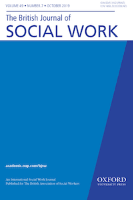
BRITISH JOURNAL OF SOCIAL WORK
Advancing Social Justice Through ResearchThe British Journal of Social Work, published by Oxford University Press, is a premier academic journal dedicated to the field of social work and its interdisciplinary connections. With an impressive history dating back to 1971, this journal has established itself as a leading forum for innovative research and critical discourse in social sciences, where it holds a distinguished ranking in the Q1 category for Social Sciences (miscellaneous) and Q2 for Health (social science) and Social Work as of 2023. Readers can expect to engage with high-impact articles that span a variety of topics including but not limited to social policy, mental health, and community practice. Although it currently does not offer open access, the British Journal of Social Work remains a key resource for professionals, researchers, and students aiming to deepen their understanding and contribute to the evolving landscape of social work practice and theory. The journal continues to foster a vibrant academic community, supporting ongoing dialogue and collaboration in the pursuit of social justice and effective welfare practices.
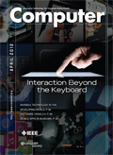
COMPUTER
Bridging Knowledge and Innovation in Computing.COMPUTER, published by the IEEE COMPUTER SOC, stands as a pivotal resource in the field of computer science, encompassing a broad range of topics and innovations within the industry. With an ISSN of 0018-9162 and E-ISSN 1558-0814, this esteemed journal features high-impact research articles that contribute significantly to the advancement of technology, demonstrating a prestigious Q1 classification in the Computer Science (miscellaneous) category for 2023. Positioned within the top percentile of Scopus rankings (ranked #84 out of 232), COMPUTER serves as an essential platform for sharing pioneering ideas and emerging trends that shape the future of computing. Although it does not currently offer open access, the journal's rigorous peer-review process ensures the publication of high-quality content. Researchers, professionals, and students alike will find invaluable insights into computer science developments from 1970 through 2024, making it a vital tool for anyone dedicated to this ever-evolving field.
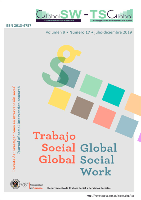
Trabajo Social Global-Global Social Work
Transforming social work education with accessible research.Trabajo Social Global-Global Social Work is a premier open-access journal published by the University of Granada's Department of Social Work, dedicated to advancing the fields of social work and social welfare on a global scale. With its ISSN 2013-6757 and E-ISSN 2013-6757, this journal has been making significant contributions since its establishment in 2010, emphasizing the importance of accessible research for practitioners, scholars, and students alike. Situated in Granada, Spain, the journal provides a platform for innovative research, critical analyses, and contemporary discussions on global social work practices, policies, and theories. By encouraging collaboration and knowledge exchange among professionals from diverse backgrounds, Trabajo Social Global plays a vital role in shaping social work education and practice around the world. Researchers and practitioners are urged to submit their work to this influential journal, as it continues to foster a deeper understanding of the challenges and opportunities in the field of social work today.
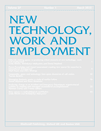
NEW TECHNOLOGY WORK AND EMPLOYMENT
Leading the Conversation on Technology's Role in EmploymentNEW TECHNOLOGY WORK AND EMPLOYMENT is a prestigious academic journal published by Wiley, focusing on the dynamic intersection of technology, work, and employment in contemporary society. With its ISSN 0268-1072 and E-ISSN 1468-005X, the journal offers critical insights into the evolving nature of work as influenced by technological advancements, making it a vital resource for researchers, professionals, and students in the fields of Human Factors and Ergonomics, Management of Technology and Innovation, and Strategy and Management. The journal has earned its status in the Q1 category for these areas in 2023, demonstrating its impact and high standards within the scholarly community, ranking in the top percentiles for respective categories according to Scopus. The journal has been in circulation since 1986 and continues to provide an open platform for rigorous research that contributes to understanding the implications of technology on employment practices. This makes it a significant resource for anyone looking to stay at the forefront of research and innovation in the workplace.
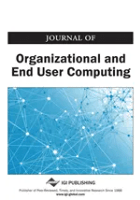
Journal of Organizational and End User Computing
Innovating Insights into User-Centric Computing PracticesThe Journal of Organizational and End User Computing, published by IGI Global, is a leading peer-reviewed outlet dedicated to exploring the intersection of organizational practices and user interfaces within the digital realm. With a robust ISSN of 1546-2234 and an E-ISSN of 1546-5012, the journal has established itself as a crucial resource for scholars and practitioners in the fields of Computer Science Applications, Human-Computer Interaction, and Strategy and Management. Recognized for its quality, the journal attained Q3 status in Computer Science Applications and Human-Computer Interaction, and Q2 status in Strategy and Management in 2023, reflecting its esteemed position in academic rankings. Operating from the heart of the United States, the journal has converged its focus from 2004 to 2024, making it a reliable source for cutting-edge research and industry trends. Although it does not offer open access, the Journal of Organizational and End User Computing remains an invaluable repository of knowledge, perfect for researchers, professionals, and students seeking to advance their understanding of organizational structures and user engagement in computing environments.
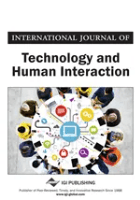
International Journal of Technology and Human Interaction
Navigating the Future of Technology and Human ConnectionInternational Journal of Technology and Human Interaction, published by IGI Global, serves as a critical platform for the exploration of the intersection between technology and human behavior, offering an interdisciplinary lens on topics within the realms of Human-Computer Interaction and Information Systems. With an ISSN of 1548-3908 and an E-ISSN of 1548-3916, this journal has been contributing to scholarly discourse since its inception in 2005, with ongoing publication until 2024. Hosting a diverse range of research articles, case studies, and reviews, the journal aims to advance the understanding of how technology influences human experience and interaction patterns in various contexts. Although currently positioned in the Q4 quartile of both Human-Computer Interaction and Information Systems categories, the journal fosters knowledge that aspires to redefine scope and standards within the field. Its commitment to quality research is reflected in its Scopus rankings, showcasing its relevance despite its emerging status in academia. Targeting researchers, professionals, and students alike, the International Journal of Technology and Human Interaction invites contributions that address the pressing challenges and innovations at the nexus of technology and human interaction.
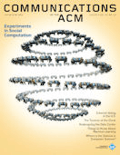
COMMUNICATIONS OF THE ACM
Illuminating Pathways in Computer ScienceCOMMUNICATIONS OF THE ACM, an esteemed journal published by the Association for Computing Machinery, has been at the forefront of the field of computer science since its inception in 1958. With an impressive impact factor and recognized as a top-tier Q1 journal in its category, it is currently ranked 10th out of 232 journals in the general computer science category according to Scopus rankings. This journal provides a vital platform for researchers, professionals, and students to disseminate innovative ideas and advancements across various domains of computing. Although it does not offer open access, the journal remains accessible through institutional subscriptions, furthering its reach and influence within the academic community. As researchers continue to explore the rapid evolution of technology, COMMUNICATIONS OF THE ACM serves as an essential resource for high-quality research, fostering knowledge advancements and collaborative discourse within the ever-expanding world of computer science.
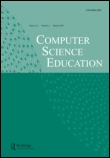
Computer Science Education
Shaping Tomorrow's Computer Scientists TodayComputer Science Education is a prestigious journal published by ROUTLEDGE JOURNALS, TAYLOR & FRANCIS LTD, focusing on the critical intersection of computer science and educational practices. Established in 1988, this journal has become a cornerstone for researchers, educators, and practitioners interested in enhancing teaching methodologies and learning outcomes in computer science. With an impressive ranking within the top quartile (Q1) in both Computer Science (miscellaneous) and Education categories for 2023, as well as high Scopus percentile placements, it underscores its significance in advancing the discipline. The journal offers a platform for innovative research encompassing diverse educational environments and approaches, and while it currently does not offer open access options, it remains committed to disseminating high-quality scholarly work. As a vital resource for anyone looking to contribute to and understand the evolving landscape of computer science education, Computer Science Education continues to shape the future of learning in this dynamic field.